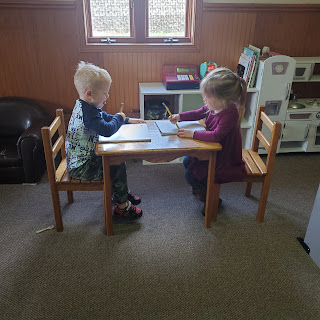Is play based academic enough? And why I get so defensive....
For 22 years I've been teaching (and learning) early childhood education. I once thought product art (the cute cookie cutter art that the teacher did 90% of the work, but the parents loved it) was what kids needed to be doing. I once thought every child's art should look the same. I once thought flashcards and work sheets were important and necessary for children to learn how to write and learn their letters.
My first job was an assistant teacher in a church preschool. One time the lead teacher gave me a week to be in charge. I planned cereal rainbows as our activity. I thought a great sorting activity, a great matching activity, a great color recognition activity... and it was for my 5 year olds. They did awesome at it and every arch had the right color... my 3 and 4 year olds struggled. You know what happened the teachers did all of the work. But... one little boy didn't want his rainbow like that. He wanted it to look different. This was the first time I was challenged by a child... Why? Why does his rainbow have to look like everyone else's? So, I let him. I let him make his rainbow his way!! He was SO proud of it! But... I got in "trouble" and I was told I was wrong for not making him do his assignment. What? He's 3!! It doesn't even make sense that he should be doing exactly what the 5 year olds could do.
I moved on to become a lead teacher in an all inclusive program. Working along side some amazing mentors. The director and I butted heads a little over Curriculum. She wanted more academic. She liked the idea of play but still wanted it academic... it could never be a true play based program I wrote my lesson plans and tried to make it as fun as I possibly could. We then got a new assistant director and she was all about play based learning! I learned so much from my friend Robin! I owe her so much! She made me the teacher I am today. Learning from her and just watching, listening to, and respecting children.
My dream... a child led play based program! No curriculum, no lesson plans, no product art, and follow the lead of the children. So... I have had to defend this way of "teaching" for over 20 years. I get defensive because of "my kiddos" and I fight for their right to play! I fight for the way children learn best! I fight for adults to respect children! I fight for children to have a voice!
Almost 9 years ago when I finally was able to open Play Learn Achieve Academy I made it my mission to create a program that will promote a love for learning! I know we are not the best fit for every parent... our hours aren't long enough, we close in the summer, we close for holidays and snow days... but I guarantee we are the perfect fit for every preschool age child. When kiddos graduate from PLA they are well rounded, creative, respectful, responsible, and so capable!
We learn letters in a meaningful way. First we learn our names. We learn how to recognize it, we learn the first letter, we learn how to write it. We learn meaningful words... exit, stop, red, blue, November, words we see in our environment. We have a journal to write in, but before we ever pick up a pencil usually around February... we first build those writing muscles with play dough, markers crayons, scissors, glue... we write with chalk, dry erase markers, in shaving cream... we do alphabet puzzles and play with ABC blocks. We have alphabet cookie cutters and stamps. When a child is ready to write they will write. When a child is ready to learn their letters they will learn their letters. The number one thing we do to teach is read! We read books every single day, multiple times a day!
We learn science from exploring our surroundings, doing experiments, and so many hands on activities. Our process art also teaches science. By using many different art mediums and utensils they learn to compare, predict, and plan out how to create what they are wanting to.
We learn math concepts from playing with blocks, the grocery store, water play. When building with blocks, they are learning how to break down numbers naturally, not through rote memorization, while also learning about symmetry and balance. We are constantly learning!
Even more importantly we are learning social skills. In a play based program children learn to be leaders, how to be a good friend, responsibility for their things, they clean up after themselves, they learn trust, they learn love, they learn kindness. I get defensive about my program because play deserves to be defended!












.jpg)

Comments
Post a Comment